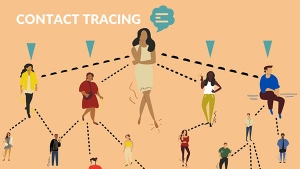Contact tracing is a system that has been used for decades to stop infectious diseases. A contact is anyone who has had direct physical contact or was within one meter for at least 15 minutes with an infected person, even if that person does not have symptoms. This applies to anyone who has had contact from two days before a person gets sick until 14 days afterwards, or from the 14 days when an asymptomatic case tested positive. Once you are confirmed as a contact, you will be asked to go into quarantine, which means to separate yourself from others, and to monitor your health for any signs of illness.

The monitoring ends on the 14th day from your last contact with the person infected with covid19. Quarantine can take place in a special facility outside of your home or at home, if you can stay separated from family members.
Why 14 days of quarantine?
It can take from 1 to 14 days from contact with the virus to develop symptoms. During this time, you should stay in quarantine and monitor symptoms, and follow instructions given to you if you become symptomatic. Without contact tracing and quarantine, the virus will continue to spread. This leads to more people becoming sick and infecting the most vulnerable. By identifying and limiting contacts of people infected with covid19, the virus stops spreading and the community stays safe. To break the chains of transmission, we all need to work together. If you become sick with covid19, stay away from others, follow the recommendations of your medical care provider and share the list of people who you came in close contact with. With your help, we can prevent further spread of the virus and save more people’s lives. By acting together, we can break the chains of covid19 transmission.

